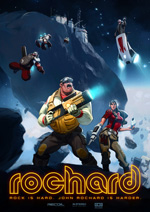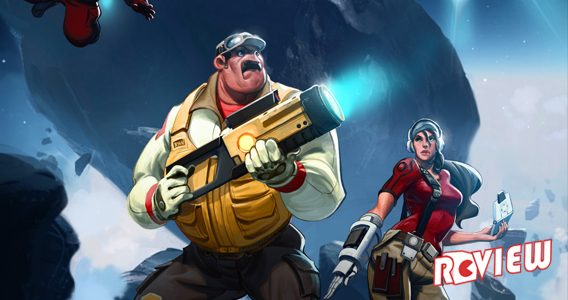
Rochard is the story of burly asteroid miner John Goodman Rochard, his accidental discovery of an ancient alien artifact, and his quest to protect it from his nefarious corporate employer. It’s a story of lasers, gravity, physics, and boxes dropped on the heads of badguys.
Rochard begins the game with naught but his G-lifter and somewhat preposterous jumping height for a man of his, uh, build. The G-lifter will snatch items from anywhere on the screen (assuming an unblocked line of sight) and pull them to Rochard, whereupon they can be set down or launched as projectiles for both puzzle and combat applications.
Rochard later acquires the ability to create zones of low gravity and fire a mining laser at enemies, alongside a handful of other offensive and puzzle-based upgrades. In true Metroid-fashion, these upgrades enhance Rochard’s ability to explore and navigate the world, while skipping the backtracking that characterizes that series.
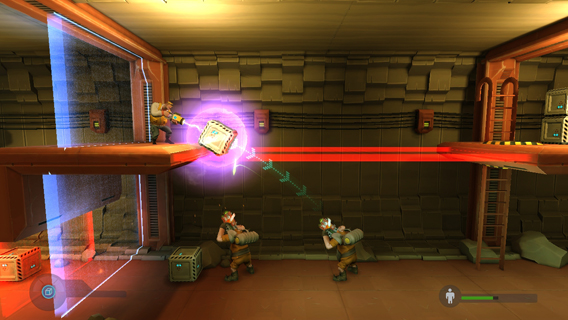
The heavy hand of the progression system, something nigh-ubiquitous in modern videogames, is felt more obviously than in other titles, and it’s felt so because it just doesn’t quite work. A well designed progression mechanic engages the player, rather than making him feel that he’s just killing time until the game becomes the game it’s supposed to be—and the latter is exactly the condition Rochard suffers from.
Rochard starts slow, almost intolerably so, and the road to good pacing is a long one. Early puzzles are more time-consuming than challenging, involving extremely simple solutions since Rochard has limited abilities. Puzzles gradually become more complex as new abilities and environmental elements are introduced, but at a rate that just isn’t fast enough to steadily engage.
Additionally, Rochard is ill-equipped to fight early enemies. Routinely dropped into areas with overlapping fields of enemy fire, Rochard’s fragility will lead to an entire catalog of frustrating deaths, upon which the not-quite-common enough checkpoints will deposit the player in such a way that a puzzle must be resolved in order to get back to the fight.
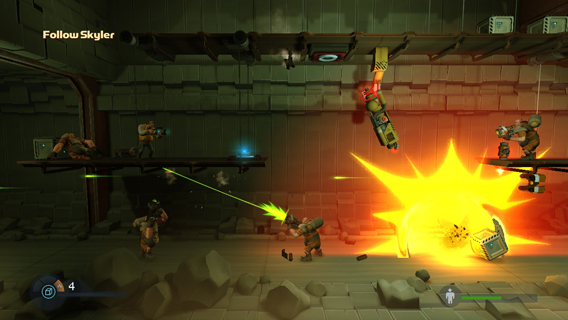
Combat requires quick thinking; using objects as shields to block fire or as projectiles to topple badguys are critical strategies, and getting into the flow of things can be difficult. After a slow and deliberate puzzle, it’s not easy to suddenly adapt to a demanding firefight, and the problem is aggravated by controls that simply aren’t designed for the quick, precise shooting that survival often requires.
Some areas, however, offer ways to lighten the load. In some circumstances, combat is a puzzle, demanding a particular pattern or strategy, or even offering the opportunity to employ environmental hazards like lasers.
I didn’t feel things had finally gelled until the last mission, whereupon all my powers were accessible and I could finally play the title with the pace, energy, and excitement I wanted to. With the full catalog of options for solving puzzles available, the challenges felt more engaging and less tedious, while the ability to swing along anchors with the G-lifter provided a great sense of movement, and the power to use the device to lift human enemies sped up combat nicely.
The final stage is a breeze to play, and it’s fair to say Rochard is overpowered at this point—and as such, I understand that the challenge of pacing the game is a difficult one. Still, while the answer may not be to hand the player everything at once, the bulk of the game simply doesn’t strike the correct balance between puzzles, combat, and progression.
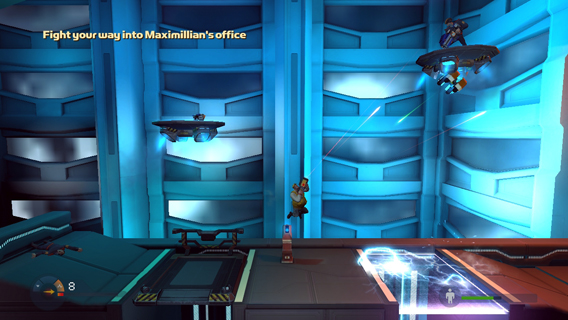
I don’t mean to suggest that Rochard is a bad game; it’s quite the opposite. Although the flaw of pacing is ever-present, the title succeeds with clever mechanics and puzzling. Puzzles are intuitively designed, usually requiring just the right amount of thought to overcome, with only a couple of unfair trouble spots.
Additionally, the game is bolstered with a solid art-style and, more noticeably, a fantastic soundtrack that switches effortlessly between southern rock and far-out sci-fi electric. Indeed, if the soundtrack has a flaw, it’s only that it isn’t used heavily enough.
Rochard runs about 6 and a half hours between five chapters. For the ten dollar price point, that’s a solid amount of game—and though Rochard could use some fine tuning to achieve its full potential, what’s provided is a clever puzzler that eventually, if slowly, builds into an exciting adventure game. If you can tolerate the occasional frustration, Rochard is worth the effort.
Recoil Games
Publisher
Sony Online Entertainment
System
PlayStation 3 (PlayStation Network)
Modes
Singleplayer
Release Date
September 27, 2011
Price
$9.99
*A copy of this title was provided by the publisher for review
